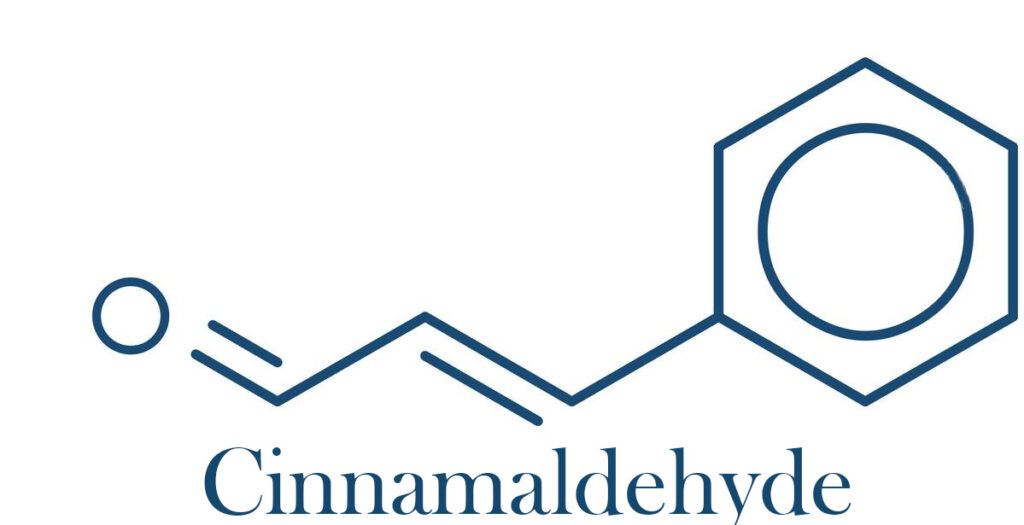Cinnamon Ceylon, the spice that has delighted taste buds for centuries, holds a treasure trove of health benefits beyond its delectable flavor. As we embark on a journey through its aromatic world, we’ll uncover the remarkable ways in which Cinnamon Ceylon can contribute to your well-being, particularly in the context of diabetes management.
Dive into the world of this flavorful spice, and discover its potential to enhance insulin sensitivity, regulate glucose levels, protect vital organs, and even reduce the risk of cataracts. Join us as we explore how Cinnamon Ceylon, with its captivating scent and taste, can become your ally on the path to a healthier, more balanced life.
Section 1: Cinnamaldehyde – The Key Compound
When we think of Cinnamon Ceylon and its remarkable health benefits, one component stands out as a star player – cinnamaldehyde. This powerful compound is the key to unlocking many of the health wonders associated with Cinnamon Ceylon.
[Image 1: Cinnamaldehyde Structure]
What Is Cinnamaldehyde?
Cinnamaldehyde is an organic compound that gives Cinnamon Ceylon its distinct flavor and aroma. It’s responsible for that warm and comforting scent that wafts from your kitchen when you’re baking with cinnamon. But cinnamaldehyde is more than just a delightful fragrance; it’s a bioactive compound with incredible potential for enhancing our health.
[Image 2: Cinnamaldehyde Extraction]

The Role of Cinnamaldehyde in Cinnamon’s Health Benefits
Cinnamaldehyde is a multi-talented compound with several properties that contribute to the health benefits of Cinnamon Ceylon:
1. Anti-Inflammatory: Cinnamaldehyde has anti-inflammatory properties, which means it can help reduce inflammation in the body. Inflammation is a common factor in many chronic diseases, making cinnamaldehyde a valuable ally in maintaining overall health.
2. Antimicrobial: This compound also possesses antimicrobial properties, making it effective against various types of infections. It can help combat bacteria and fungi, supporting your immune system in its fight against pathogens.

3. Anticancer Potential: Cinnamaldehyde has shown promise in studies related to cancer prevention. Research suggests that it may inhibit the growth of cancer cells and even trigger cancer cell death in some cases.
Incorporating Cinnamon Ceylon into your diet allows you to benefit from the cinnamaldehyde content. Whether you sprinkle it on your morning oatmeal or brew it into a warm cup of tea, you’re harnessing the potential of this remarkable compound to support your health.
Section 2: Anti-Inflammatory Properties
Cinnamon Ceylon, celebrated for its rich flavor and aroma, is not only a kitchen staple but also a potent natural remedy with notable anti-inflammatory properties. In this section, we’ll delve into how Cinnamon Ceylon acts as an anti-inflammatory agent and its impact on reducing inflammation in the body.
The Anti-Inflammatory Power of Cinnamon Ceylon
Inflammation is a natural response of the body to harmful stimuli, such as pathogens, injuries, or irritants. However, chronic inflammation, often triggered by factors like an unhealthy diet or stress, can lead to a range of health issues. This is where Cinnamon Ceylon comes to the rescue.

How Cinnamon Ceylon Combats Inflammation
Cinnamon Ceylon contains cinnamaldehyde, a key compound with anti-inflammatory properties. This means it has the ability to reduce inflammation in the body. Here’s how it works:
1. Inhibiting Inflammatory Enzymes: Cinnamaldehyde can inhibit the activity of certain enzymes that promote inflammation. By doing so, it helps dial down the body’s inflammatory response.
2. Antioxidant Action: Cinnamon Ceylon is rich in antioxidants that neutralize harmful free radicals. This antioxidant action helps protect cells and tissues from oxidative stress, a common trigger of inflammation.
The Wider Impact
By reducing inflammation, Cinnamon Ceylon may contribute to overall health and well-being. Chronic inflammation is linked to various chronic conditions, including heart disease, diabetes, and some cancers. Therefore, incorporating Cinnamon Ceylon into your diet can serve as a proactive step in managing inflammation and potentially lowering the risk of such health issues.
Section 3: Antimicrobial Benefits
Cinnamon Ceylon, often appreciated for its warm and aromatic presence in the kitchen, holds another impressive quality – its powerful antimicrobial properties. In this section, we’ll highlight how Cinnamon Ceylon’s antimicrobial benefits can combat various infections and contribute to improved overall health.

The Antimicrobial Power of Cinnamon Ceylon
Antimicrobial properties refer to the ability to inhibit or destroy the growth of microorganisms, including bacteria, viruses, and fungi. Cinnamon Ceylon is no stranger to this domain.
How Cinnamon Ceylon Combats Infections
Cinnamon Ceylon’s antimicrobial properties primarily stem from its key compound, cinnamaldehyde. Here’s how it can help combat infections and boost your overall health:
1. Bacterial Infections: Cinnamaldehyde has been found effective against a range of bacteria. It can help prevent and combat bacterial infections, making it a valuable tool in maintaining your health.
2. Antiviral Action: Cinnamon Ceylon is known for its antiviral properties. It can be beneficial in fighting viral infections, including the common cold and influenza.
3. Antifungal Potential: Fungal infections can be troublesome, but Cinnamon Ceylon’s antifungal potential can help control and prevent such infections.
A Holistic Approach to Health
By incorporating Cinnamon Ceylon into your daily routine, you not only add a delightful flavor to your dishes but also a layer of protection against infections. This holistic approach to health extends beyond just seasoning your food; it’s a proactive step in fortifying your immune system and promoting overall well-being.
Section 4: Anticancer Potential
Cinnamon Ceylon, the versatile spice found in kitchens worldwide, has been gaining recognition not just for its culinary delights but also for its potential in the realm of cancer prevention. In this section, we’ll explore the anticancer potential of Cinnamon Ceylon, including its role in preventing and combating cancer.
Unveiling the Anticancer Power of Cinnamon Ceylon
Cancer, a complex and often devastating group of diseases, has been a focus of extensive research, including the exploration of natural remedies like Cinnamon Ceylon. While the field is ongoing, promising findings have been made.

How Cinnamon Ceylon May Prevent and Combat Cancer
Cinnamon Ceylon’s anticancer potential is associated with its rich content of bioactive compounds, including cinnamaldehyde and antioxidants. Here’s how it may contribute to cancer prevention:
1. Inhibiting Cancer Cell Growth: Research suggests that compounds in Cinnamon Ceylon, such as cinnamaldehyde, may inhibit the growth of cancer cells. They can disrupt the mechanisms that promote the uncontrolled division of cells.
2. Inducing Cancer Cell Death: Some studies have shown that Cinnamon Ceylon may trigger apoptosis, a process of programmed cell death in cancer cells. This can help eliminate harmful cells from the body.
3. Antioxidant Protection: The antioxidants in Cinnamon Ceylon can neutralize free radicals and reduce oxidative stress. By protecting cells from damage, they may lower the risk of cancer development.

The Quest for Definitive Answers
It’s important to note that while research has generated positive findings, the quest for definitive answers on Cinnamon Ceylon’s role in cancer prevention is ongoing. Many factors influence cancer risk, and a holistic approach to health is essential. Incorporating Cinnamon Ceylon into your diet is just one piece of the puzzle.
Section 5: Antidiabetic Effects
Cinnamon Ceylon, known for its aromatic allure in the culinary world, offers a multifaceted approach to combat diabetes. In this section, we will explore its potential in enhancing insulin sensitivity, regulating glucose levels, suppressing liver fat, protecting the kidneys, restoring peripheral dysfunctions, reducing the risk of cataracts, preventing harmful lipid accumulation, and alleviating brain inflammation associated with diabetes.
Insulin Sensitivity: How Cinnamon Ceylon Enhances Insulin Sensitivity
Insulin sensitivity is a crucial factor in diabetes management. Cinnamon Ceylon, with its bioactive compounds, has been linked to improved insulin sensitivity. This means it may enhance the body’s response to insulin, helping to regulate blood sugar levels more effectively.

Glucose Sensitivity: Regulating Glucose Levels
Cinnamon Ceylon has shown promise in moderating glucose levels, making it a valuable addition to the diet of individuals with diabetes. It can help prevent extreme spikes and crashes in blood sugar, fostering better glycemic control.
NAFLD (Non-Alcoholic Fatty Liver Disease): Suppressing Liver Fat and Benefits for Liver Health
Non-Alcoholic Fatty Liver Disease is a common concern for those with diabetes. Cinnamon Ceylon has demonstrated the ability to suppress liver fat accumulation, contributing to overall liver health.

Kidney Protection: Safeguarding Kidneys from Damage
Diabetes can affect the kidneys, leading to potential damage. Cinnamon Ceylon has been investigated for its role in protecting these vital organs and reducing the risk of diabetic nephropathy.
Restoration of Peripheral Dysfunctions: Reversing Diabetes-Related Nerve Damage
Peripheral dysfunctions, often linked to diabetes, can affect nerves and limbs. Cinnamon Ceylon shows potential in restoring peripheral functions that may be compromised by diabetes.
Cataract Risk Reduction: Lowering the Risk of Cataracts Among Diabetics
Cataracts are a common concern for individuals with diabetes. Cinnamon Ceylon’s antioxidant properties may reduce the risk of cataracts, safeguarding eye health.
Preventing Harmful Lipid Accumulation: Maintaining Cardiovascular Health
Cinnamon Ceylon’s ability to prevent harmful lipid accumulation can help in managing cardiovascular health. It can reduce the risk of heart-related complications in diabetics.
Reducing Brain Inflammation: Alleviating Inflammation in the Brain
Brain inflammation related to diabetes can have adverse effects on cognitive function. Cinnamon Ceylon’s anti-inflammatory properties may help reduce such brain inflammation.
[Image 9: Brain Health]
These potential antidiabetic effects make Cinnamon Ceylon a flavorful and potentially healthful addition to the diet of individuals managing diabetes. However, it should be part of an overall diabetes management plan that includes medication, exercise, and dietary choices.
Conclusion
Cinnamon Ceylon, with its tantalizing aroma and distinctive flavor, has proven itself to be more than just a kitchen staple. It’s a spice with remarkable potential to support health, particularly in the realm of diabetes management.
As we explored earlier, Cinnamon Ceylon offers a diverse array of health benefits, from enhancing insulin sensitivity to regulating glucose levels. It even extends its protective mantle to vital organs like the liver and kidneys, reducing the risk of complications. This versatile spice has shown promise in restoring peripheral dysfunctions, reducing the risk of cataracts, and preventing harmful lipid accumulation. It also plays a role in alleviating brain inflammation associated with diabetes.
While these findings are exciting, it’s crucial to remember that Cinnamon Ceylon should be viewed as a complementary component of a comprehensive approach to diabetes management. Medication, regular exercise, and a balanced diet are all integral elements of a successful strategy.
Incorporating Cinnamon Ceylon into your culinary creations not only adds a burst of flavor but also the potential for better diabetes management. Whether you choose to sprinkle it over your morning oatmeal or stir it into a comforting cup of tea, this spice has the potential to be your ally on the path to a healthier, more balanced life.
In the world of diabetes management, Cinnamon Ceylon stands as a flavorful and potentially healthful addition. It’s a testament to the idea that our culinary choices can do more than satisfy our taste buds; they can also contribute to our well-being.
So, savor that sprinkle of Cinnamon Ceylon, and let its potential benefits enhance your journey to better health.
Resources
- National Center for Biotechnology Information (NCBI)
- Harvard T.H. Chan School of Public Health
- Mayo Clinic
- Diabetes Forecast

0 thoughts on “Cinnamon Ceylon: Your Key to Defeating Diabetes and More”